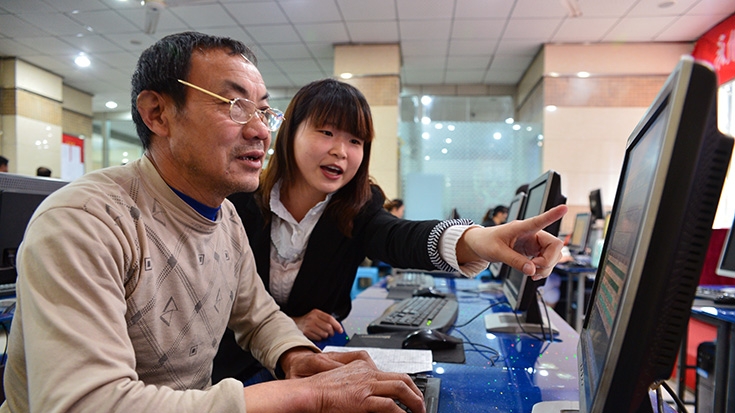Over the past 40 years, China’s population has been aging at a rate that took more than 100 years in developed countries. In 2010, the number of people over 60 years old reached 178 million in China, accounting for almost a quarter of the world’s total. Many older citizens in China’s rural areas have found themselves increasingly isolated as their younger relatives migrated to the cities. Few older citizens in rural areas use the Internet. But advances in connectivity, including rapidly improving Internet services in rural areas, offer opportunities for greater development and participation in society of the rural elderly.
The World Bank in partnership with the Bill & Melinda Gates Foundation has been supporting Chinese government’s efforts to improve access to information and communication technologies (ICT) and related services for enhancing the lives of rural residents. As a part of the initiative, a study was recently undertaken to assess the potential of enhancing ICT usage among older people in China and examine the feasibility of leveraging public libraries and library-like institutions to serve as venues to foster digital and social inclusion of senior citizens and improve their well-being. Findings from the report were compiled into a report entitled Fostering a digitally inclusive aging society in China: the potential of public libraries.
By the end of 2012, there were 3,076 public libraries (including children's libraries) in China at the county level and above, with almost 55,000 employees. All provincial, regional, and municipal centers have at least one library and 90 percent of county seats had a public library. Public libraries are free and available to everyone. Some libraries, for example in the Suzhou network, have started to develop specific programs supporting the particular needs of senior citizens.
“China’s vast network of public libraries has the potential of becoming important hubs for the rural elderly to develop digital skills, stay connected with families and access online services—whether information about health, new skills, financial services, or practical advice,” said Natasha Beschorner, Senior ICT Policy Specialist for the World Bank.
“We are assisting the government in implementing its vision for accelerating the development of the aged care services. Community-based care is a key part of the a three-tiered system of social services for the aged that also envisages home-based family care as its bedrock and institutional care in a support function. Public libraries can play an important role in supporting the development of the community-based delivery model allowing for learning about the needs of the elderly and offering them various digital services,” said Elena Glinskaya, World Bank’s Program Leader for Education, Health and Social Protection in China.
The study concludes that libraries can make an important contribution in providing access to electronic information and training in digital literacy. Public libraries have a well-established role and experience in these areas in the world and increasingly in China. Access to the Internet allows the elderly to get information about health issues, stay in touch with family members, access lifelong education opportunities, shop online and obtain government services. A number of countries that have implemented innovative programs for the elderly in public libraries are showcased including Lithuania, Poland and Australia. Further, countries like Japan and Korea have extensive programs aimed more broadly at the overall usage of ICTs by the elderly population.

